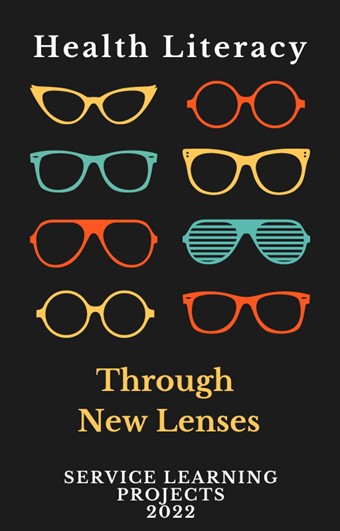
Preparing leaders to inform policy and practice through public service is central to the mission of the Muskie School. The academic programs offer Service-Learning opportunities where students apply course content and skills in collaboration with community partners. Health Literacy and Communication (MPH 580), a course offered through the public health program, draws graduate students from multiple disciplines including public health, occupational therapy, nursing, and business. These interprofessional learning experiences provide direct exposure to the teamwork competencies expected in workplace settings. Students in the Health Literacy course participate in a culminating activity working in small interprofessional teams and applying best practices to address a community partner need.
MPH 580 is an asynchronous online course with students located in Maine and around the country – as far away as California. While this fall’s class was initially nervous about small team projects most especially in an online course, these students embraced their assignments with enthusiasm, professionalism, and a keen sense of purpose. Course instructor, Dr. Judy Tupper, solicited project ideas from eight organizations. Community partners included health care organizations and local area non-profits, as well as USM Health Services and USM Counseling Services. The interprofessional teams were given just two weeks to engage with their peers, meet the stakeholders, and produce the requested deliverable using the skills, materials, and resources from the course.
The community partners and requested deliverables vary from year to year. This year, the team projects included designing suicide prevention messaging, post-op surgical instructions, infection prevention patient education, consumer information for a behavioral health clinic, a low-literacy pain assessment tool for agricultural workers, social media and website reviews, and a fall prevention checklist. Additionally, one team prepared health promotion materials and met with Special Olympics participants at a Health Fair arranged by the USM Athletic Training department.
The team projects were quite successful, genuinely appreciated by our community partners, and the students were delighted with the meaningfulness and impact of the activity.
This assignment was a great chance to work with other students with different backgrounds and provided us with an opportunity to incorporate all the skills and resources provided in this course.
I am extremely proud of the work our team did. We all drew on our individual expertise
and experience, while incorporating the tools we obtained in the class, to create a small but
valuable contribution to patient education.
After I finished, I felt a great deal of pride. I felt that I was making a difference. This project was not only educational but impactful, and I am so glad that I had the opportunity to work with a great group to make a difference.
Senator Muskie challenged us to make a real difference in the lives of the people of Maine and the nation. At times it can feel as though the semesters fly by with little time to reflect on how we are meeting our core mission. As evidenced by the student reflections above, it is clear that creating space for Service Learning in the academic preparation of our future leaders is one way to carry forward the values, ideals, and contributions of Senator Muskie.

